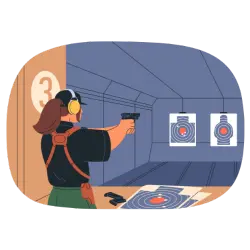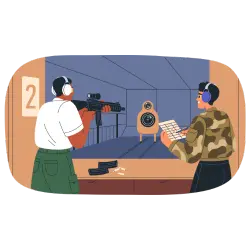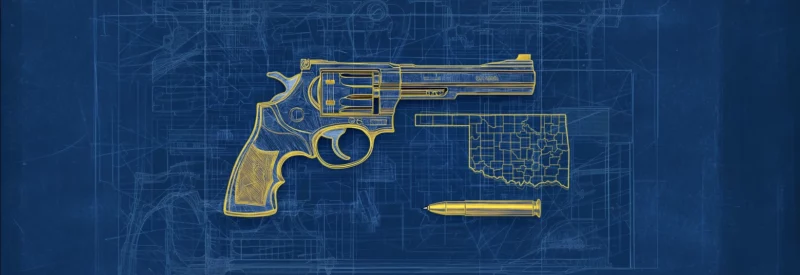TABLE OF CONTENTS
- Getting an Oklahoma FFL: An Introduction
- Step 1: Meet All of the FFL Requirements
- Step 2: Select the Type of FFL You Need
- Step 3: Complete an Online FFL Course
- Step 4: Apply For Your Oklahoma FFL
- Step 5: Have an Interview with a Representative From Your Regional ATF Office
- FFL License Costs in Oklahoma
- Getting a Federal Firearms License in Oklahoma: Closing Thoughts
- Oklahoma FFL FAQs
Anyone buying, selling, or manufacturing firearms in the state of Oklahoma must apply for an FFL, better known as a federal firearms license. This article will outline the five essential steps to successfully acquire an FFL in Oklahoma. We’ll cover everything from strategy and planning to the ins and outs of working with FFL dealers.
Here are the basics of acquiring an FFL in Oklahoma, including license options and details on critical state and federal requirements.
Getting an Oklahoma FFL: An Introduction

A Federal Firearms License, or FFL, is a license that permits an individual to conduct business in the firearms sector. This extends to manufacturing, importing, and selling weapons. It also encompasses the selling of ammunition (either online or in-person), as well as other firearm-related accessories. To secure an FFL, you must apply to the Bureau of Alcohol, Tobacco, Firearms, and Explosives (ATF).[1]ATF. “ATF”. Accessed on June 3, 2024.
There are nine different license options for obtaining an FFL. Each allows the holder to conduct certain activities depending on the business. Before choosing the appropriate license, consider your professional needs and how they may evolve over time.
Applying for a federal firearms license can be taxing. The whole process can take several months from start to finish, can be costly, and may involve a lot of paperwork. However, once you’ve secured your license, you are free to start selling guns and firearm accessories according to local laws and regulations.
Below, we’ll explain step-by-step what it takes to get your FFL in Oklahoma, explore licensing costs, and answer frequently asked questions.
Step 1: Meet All of the FFL Requirements
The first step towards getting an FFL in Oklahoma is confirming your eligibility. The ATF sets a standard that all states must abide by. Each state can impose additional mandates should they deem it necessary. Merchants are encouraged to begin the process at the federal level. If a merchant finds that they can’t meet those requirements for any reason, they won’t be able to receive an FFL in any state, Oklahoma included.

Federal Requirements
The federal requirements for securing an FFL are the same in every state. The organization in charge of establishing and enforcing these requirements is the Bureau of Alcohol, Tobacco, Firearms, and Explosives (ATF). The ATF has a comprehensive list of conditions that merchants must meet in order to be considered eligible. One stipulation dictates that an individual must be at least 21 years of age, either a permanent resident of the U.S. or a natural-born citizen, and not have a criminal record.

State requirements
The next step involves meeting state requirements. Remember, each state, including Oklahoma, can impose additional licensing and regulations. State requirements are split into two categories: state licensing and registration requirements.

State licensing requirements
Oklahoma is a gun-friendly state. Oklahoma has no supplementary licensing requirements beyond those that exist at the federal level. To put it in more conventional terms, all you need to start a firearms business in Oklahoma is an official FFL. Other states may require you to jump through more hoops.

State registration requirements
The next step in obtaining your Oklahoma FFL involves registering your business with the state. Have your business plan set in stone and registered before formally submitting your application. When dealing with government agencies, you can never be too prepared.
You must also re-register your business if you are moving from another state. Even if you were previously registered in another state, you must be registered in Oklahoma to receive an Oklahoma FFL.

Local and zoning requirements
Oklahoma merchants have plenty of options when applying for an FFL. You can aim for a brick-and-mortar FFL, a home-based FFL, or even an eCommerce option. However, many zoning departments hear “firearms” and hesitate to grant approval. When faced with this, you will need to explain your business plan in detail to the zoning department. This is where you get a chance to really sell your business: outline the foot traffic you expect, discuss background checks and waiting period details, and explain how your presence may affect the surrounding area. Presenting these issues to the zoning department in a clear and concise manner can help both parties come to a mutually beneficial understanding.
Step 2: Select the Type of FFL You Need
Oklahoma-based gun merchants will need to consider several options regarding which FFL is right for them. Here are the criteria merchants should consider:
- Types of weapons. Determine what type of firearms you’ll be dealing with. Are you in the business of manufacturing guns? What about importing or selling antique weaponry? Once you’ve done this, you can narrow down your choices and compare different varieties of FFLs to see which option makes the most sense for you.
- Business model. Are you planning on selling NFA-regulated weapons? Are you running a retail outlet or operating an eCommerce platform? How are you getting inventory—through wholesalers, manufacturing, or importing? How do dealers factor into your operation? These decisions will help you understand which specific FFL to select for your business.
Each FFL type comes with its own unique set of requirements. Be sure to do plenty of research before selecting the license that best suits your needs.

FFL license types
As mentioned earlier, nine different federal firearms licenses fall under the categories of manufacturing, importing, and selling. Understanding which type of FFL you’ll want to apply for will help shape your business needs and brand identity moving forward. Oklahoma gun merchants have plenty of options in this regard, so it is imperative that they choose wisely.
Step 3: Complete an Online FFL Course

There are several advantages to taking an online firearms licensing course. For one, it can help you stay a step ahead of the competition. These courses also offer a thorough education on gun laws in the U.S., which can help you avoid potential legal troubles. Certain courses also provide valuable pointers on practical skills like marksmanship, basic gun safety, and the requisite certification that will allow you to safely handle and process firearms. Ultimately, an online firearms licensing course is a wise investment for anyone entering this industry.
While we always recommend completing an online FFL course, it is not legally required. However, serious merchants should consider this step as they prepare to launch their business.
Step 4: Apply For Your Oklahoma FFL
Once you’ve chosen a business plan, set up a merchant account, decided whether you want to operate a brick-and-mortar business or a home-based FFL, and selected the license option that meets your needs, you can consider yourself eligible based on federal requirements. This means you are officially ready to apply for your Oklahoma FFL. You will need to provide the following:
- Fingerprints: For conducting a criminal background check.
- Photographs: For the creation of your personal FFL license.
- A completed Application for a Federal Firearms License.[2]ATF. “Application for Federal Firearms License”. Accessed on June 3, 2024.
Step 5: Have an Interview with a Representative From Your Regional ATF Office
This final step involves an interview with an Industry Operations Investigator, also known as an IOI. Essentially, the IOI is there to ensure you understand the proper firearms industry regulations. They will also ensure you have chosen an appropriate location for your business, in addition to asking you questions about your business plan, how you plan to store firearms and ammunition, and exactly what security measures you plan to implement. Following this meeting, the IOI will determine whether or not you are qualified to receive an Oklahoma FFL.
FFL License Costs in Oklahoma
The price of an FFL in Oklahoma is the same as in any other state. The ATF sets a federal price for each federal firearms license, assuming you pay between $30 and $200 for it. Some FFLs can cost up to $3,000, although these pricier options are generally for more specialized permits (i.e., most new businesses must apply for the upper echelon of FFL types). When calculating the cost of your long-term business plan, note that each FFL is good for three years before it’s time to renew. You will also need to decide how you would like to accept a variety of payment options.
Getting a Federal Firearms License in Oklahoma: Closing Thoughts
There are many reasons why a merchant might want to start a firearms business in Oklahoma. Oklahoma does not require any auxiliary licensing beyond standard federal demands. Second, according to NSSF, Oklahoma has a robust gun culture, having ranked 14th in the nation with 114 firearms manufacturers that provide over 4,500 jobs within the firearms industry.[3]NSSF. “Oklahoma Hunting for Gun Business • NSSF”. Accessed on June 3, 2024./
Oklahoma is an ideal place for entrepreneurs looking to get a leg up in the world of selling and trading firearms. The FFL license process exists to ensure that merchants proceed through these steps in a safe, legal, and practical manner. For most merchants working at the professional level, meeting the demands of state and federal authorities will be the easy part. Instead, finding a partner willing to work with you may prove to be a challenge.
Many financial institutions still consider the firearms industry high-risk, meaning they may be wary of a potential partnership. This is why you should take time to find a gun-friendly merchant services provider who understands your specific needs. Once you’ve done this, you’ll be one step closer to launching your successful firearms business.
Tired of hearing “no”?
PaymentCloud has a 98% approval rating.
Approval
Rating
Oklahoma FFL FAQs
Here is additional information about the process of securing a federal firearms license in Oklahoma.
Do I need an FFL in Oklahoma?
You will absolutely need a federal firearms license to manufacture, sell, or import firearms in Oklahoma. FFLs are federally regulated, meaning you will still need one even if you end up leaving the state.
Who can apply for an FFL in Oklahoma?
Any merchant who meets the federal requirements can apply for an Oklahoma-based federal firearms license. The ATF sets these requirements.
Do I need to register as a business to get an Oklahoma FFL?
You must register with the state before applying for your FFL in Oklahoma. The same is true for business owners with a preexisting business in another state.
How can I find an FFL dealer in Oklahoma?
There are several options when it comes to locating a viable FFL dealer in Oklahoma. Here are three ways to find a dealer near you:
- ATF website. The easiest and most reliable way is to access the Bureau of Alcohol, Tobacco, and Firearms (ATF) website and use their online search tool.
- Directories. Firearms directories allow users to search for FFL dealers by category and state.
- Check with your network, ask around, talk to people you trust, and get a second opinion. Someone you know may be able to recommend a reliable, licensed dealer in your area.
Whichever method you choose, be sure to call ahead and verify that the dealer can handle your transaction.
Can you have a home-based FFL in Oklahoma?
You can operate a home-based FFL in Oklahoma if you meet the federal requirements.
Can I apply for an FFL with an Oklahoma gun trust?
Business owners in Oklahoma cannot use gun trusts to apply for FFLs. Any individual who plans on selling, importing, or manufacturing weapons or firearms will need to apply for an individual FFL.
Does the BATF&E have requirements for an FFL in Oklahoma?
Yes, the BATF&E, known in abbreviated form as the ATF, is the organization that sets the federal requirements needed to obtain an FFL.
Do I need to apply for a SOT for my Oklahoma FFL?
If you are an FFL-licensed dealer planning to sell NFA firearms, you must apply to become a special occupational taxpayer, or SOT.[4]ATF. ”Which firearms are regulated under the NFA?” Accessed on June 3, 2024. As a category, NFA encompasses items such as silencers, machine guns, and short-barreled shotguns. You do not need to apply to become a particular occupational taxpayer to obtain a standard FFL in Oklahoma.
How long does it take to get your FFL in Oklahoma?
Once you have submitted your application for an Oklahoma FFL, you should receive a response from the ATF within 60 days. That said, organizing all the necessary paperwork before submission can be time-consuming, so factor that into your timeframe.
How can I transfer an FFL in Oklahoma?
Transferring an FFL in Oklahoma is not an option for business owners. Every person involved in the firearms industry must undergo the application process individually.
How much does an FFL transfer cost in Oklahoma?
Transferring a firearm in Oklahoma generally costs somewhere in the range of $20 to $200. The exact nature of the FFL transfer depends on the brand of firearm you are transferring and the company performing the transfer.
How hard is it to get an FFL in Oklahoma?
Getting an FFL in Oklahoma presents challenges but is ultimately more manageable than in other, less gun-friendly states. As long as you pass the federal requirements, you’ll be on track to launch your fire




